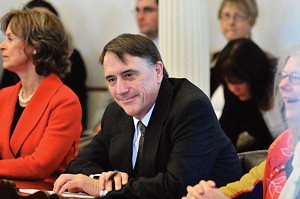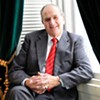Published March 28, 2012 at 7:26 a.m.
It’s a typical day in the Vermont legislature, and Sen. Peter Galbraith (D-Windham) is hearing testimony on a pet-merchant bill in a cramped committee room. Designed to crack down on unregulated breeders, the legislation would require anyone selling animals for money to be licensed by the state and subject to inspections.
It’s a far cry from where Galbraith was sitting two years ago: at a negotiating table with Afghan President Hamid Karzai discussing the sensitive subject of election fraud.
The Windham County senator’s biography reads like the plot of a James Bond movie — if 007 were a diplomat rather than a spy.
As a globe-trotting teenager, Galbraith hitchhiked across the Libyan desert, rode a Mark Twain-style riverboat down the Amazon and toured the Soviet Union in a Volkswagen bus.
As a U.S. Senate staffer in the 1980s, he helped uncover Saddam Hussein’s gassing of the Kurds and narrowly escaped mortar fire to deliver a home video of the shelling to ABC News.
Several years later, while serving as the U.S. ambassador to Croatia, Galbraith negotiated the peace accord that ended the four-year Croatian War of Independence. That, in turn, led to a United Nations appointment in newly independent East Timor, where he helped rebuild a country ravaged by its departing colonial occupiers.
In between, Galbraith is credited with helping to secure the release of a high-profile political prisoner: Benazir Bhutto, the former prime minister of Pakistan, who was Galbraith’s longtime friend. He also found time to pen two books on the war in Iraq, as well as numerous articles and op-eds.
Today, Galbraith maintains a private business as a sort of freelance diplomat, jet-setting from Vermont to far-flung locales including South Sudan and South Korea to advise powerful world leaders on matters of national interest.
So it surprised many in 2010 when he made a bid for the Vermont Senate. After a three-decade career at the highest levels of international diplomacy, the 61-year-old from Townshend decided to run for the seat vacated by Gov. Peter Shumlin. Assisted by considerable name recognition and $45,000 of his own money, the Democrat finished first among five candidates, 520 votes ahead of incumbent Sen. Jeanette White.
Now approaching the end of his first term, and gearing up to seek a second, Galbraith has emerged as the 30-member Senate’s most unconventional member — and arguably its most disliked. He has bucked his own party and upset the Senate’s carefully established pecking order, going rogue on the floor with long speeches, interrogations of colleagues and substantive amendments that disregard the back-room deals typically made among Senate leaders.
Galbraith’s detractors view him as “abrasive,” “self-important” and “pompous” — and those are just the words used by the Democratic Senate president.
His defenders describe him as an extremely bright policy maker whose tough questions and contrarian viewpoints often ruffle feathers under the Golden Dome — a slower-paced, more deferential environment than Galbraith may be accustomed to.
At a Senate caucus last week, Senate President Pro Tempore John Campbell (D-Windsor) sought to reinforce order by imploring members not to make speeches on every bill or “try to create sound bites every 30 seconds.” Campbell says the message was directed at all freshman senators — not just Galbraith — but others present viewed the order as squarely aimed at the outspoken former diplomat.
Galbraith’s outsider status hasn’t won him many friends, or much support for his own legislation. But he has managed to exert influence nonetheless. He has single-handedly stalled a campaign-finance-reform bill by threatening to attach a floor amendment banning corporate contributions to Vermont candidates — and promising to request a roll call to put every senator on record.
Unlike most of his colleagues, Galbraith believes corporate donations have “an enormous” influence on Vermont politics and are one reason why “it’s so hard to address the big issues around here.” Plus, he says, “the campaign finance bill was a sham. It pretended to do something without doing anything.”
Of course, Galbraith doesn’t need outside money — from corporations or individuals — to run for office, thanks in part to a lucrative oil deal he struck in Iraqi Kurdistan during the war several years ago. Galbraith doesn’t apologize for profiting from that controversial deal, or for his independent — some would say rebellious — behavior in Montpelier. His loyalty is to his constituents, he says, not to his party or its leaders.
And though he toyed with running for governor in 2008, Galbraith says his state Senate service is not a warm-up act to a run for governor, Congress or U.S. Senate. And that allows him to speak his mind more freely than most senators, he says.
Galbraith sees parallels between the state Senate and the diplomatic world. “To be effective as a diplomat, you have to learn the local cultures and study the tribes, the clans, the political parties, the personalities,” he says. “This is very similar. I spend a lot of time observing and trying to figure things out.”
And therein lies the irony. As a diplomat, Galbraith was a natural — brokering a peace treaty in one nation, helping to rebuild another, exposing atrocities by foreign dictators and learning five languages along the way. But, so far at least, he has failed to win the respect of key elders in Vermont’s political tribes.
Galbraith is conversant in German, Russian, French, Croatian and Dari — a language spoken in Afghanistan. But after nearly two years in Montpelier, he’s still learning to speak Vermont Senate.
From Karachi to Committee
On the world stage, Peter Galbraith is a big deal. His private consulting business, Windham Resources Group — which helps foreign governments and businesses develop negotiating strategies — took him across the Atlantic 20 times last year, to Africa, Europe, the Middle East and Asia. So far this year, he’s gone on HBO’s “Real Time With Bill Maher” to discuss conflict in the Middle East, and on BBC News to comment on a U.S. soldier’s alleged massacre of 17 villagers in Kandahar.
In the middle of January, Galbraith flew to Pakistan for the weekend at the request of President Asif Ali Zardari, the widower of Benazir Bhutto and a longtime friend. He was back on the Vermont Senate floor by Tuesday morning.
“I was asked by the president of Pakistan to come and stay with him,” Galbraith says during an interview at the Statehouse last week. “His government was under huge threat from the Supreme Court in Pakistan, which is a fairly partisan institution.”
In Montpelier, however, Galbraith is treated like any other freshman senator. He didn’t get the committee assignments he wanted; he requested Health and Welfare; Finance; and Natural Resources and Energy but was instead placed on Economic Development, Housing and General Affairs; and Government Operations — or Gov Ops.
The latter committee was supposed to handle reapportionment this year — the once-a-decade redrawing of Senate district lines. But Senate leaders gave that job to a select committee — and declined to put Galbraith on it. In dramatic protest, he submitted a letter of resignation from the committee — which was not accepted — and boycotted its meetings for several weeks.
“He’s used to being the alpha dog, and now he’s one of the puppies,” observes Sen. Peg Flory (R-Rutland), who serves with Galbraith on the Gov Ops committee. “I think, for Peter, it’s been a difficult adjustment. He’s more used to being in charge.”
Being effective in the Senate requires learning “how to play well with others,” Flory says, without compromising your core values. “You have to learn how to get along. If you don’t, regardless of how bright you are or how good your ideas are, you quickly marginalize yourself.”
Campbell puts it more bluntly.
“The reason his ideas are not embraced, quite frankly, is because of the way he treats people,” Campbell says during an interview in the Senate president’s office. “He often comes across as being arrogant, abrasive, condescending, and people just don’t like that. No one likes to be treated as if their intelligence is being questioned.”
Campbell adds, “Peter is somebody who has a tremendous number of gifts that he could offer and could be utilized. But because of his personality, people aren’t going to listen to him.” That said, Campbell admits Galbraith has supplied some “constructive criticism” on his leadership.
While Campbell is talking, Sen. Jane Kitchel (D-Caledonia), the powerful chair of the Senate Appropriations Committee, walks into the office. She’s there to discuss Senate business, but Campbell asks her to weigh in on Galbraith, and Kitchel offers some advice for the freshman senator.
“When you come to this body, you give deference to the people who have served and have experience,” Kitchel says. “You listen, and basically you sit down and stay quiet until you can establish your own track record and credibility.”
Galbraith couldn’t see his role more differently. Acknowledging that his outspokenness has rocked the boat a little, Galbraith says he was elected to tackle a whole host of issues, “not just the ones that happen to be in the purview of the committees that I’m on.”
To that end, he’s introduced legislation to ban hydrofracking, to prohibit wind turbines in state parks and forests, and to expand broadband and cellular service in Vermont. Galbraith says Vermont’s health care reform is a “huge opportunity” comparable to the creation of Social Security almost a century ago, and he offered several floor amendments to last year’s health care bill.
One of them would have exempted military service members from paying into the future state-created insurance plan, because service members already pay for federally run health plans. Galbraith’s amendment passed the Senate on a voice vote but was deleted from the bill in a conference committee.
Galbraith has also proposed three amendments to the state constitution. One would establish a right to privacy; another, a right to health care; and a third would provide for a set of “environmental rights” such as clean water and “a natural environment uncompromised by manufactured substances that are toxic and unhealthy.”
His motivation? His constituents “care enormously about health care and environmental issues,” Galbraith says. “The notion that I would not participate or offer amendments... I’m not going to do that.”
Galbraith’s defenders in the Senate dispute the prevailing portrait of him as an elitist know-it-all. Sen. Anthony Pollina (P/D-Washington), who first met Galbraith in the late 1970s, calls him “one of the sharpest minds around.”
Sen. Vince Illuzzi (R-Essex/Orleans) likens Galbraith to a “12-cylinder race car” driving on a track not known for its speed. In this metaphor, the track is the legislature.
“He’s a quick study,” says Illuzzi, who chairs the economic development committee on which Galbraith serves. “He’s able to be more nimble and move toward an action plan before others are able or willing to do so. He’s more willing to go faster.”
Galbraith didn’t waste any time last month during a Senate floor showdown over a controversial budget bill. Illuzzi, Galbraith and Sen. Tim Ashe (D/P-Chittenden) wanted to tack $250,000 onto a midyear budget bill to study whether the state should buy a majority stake in the Vermont Electric Power Company, or VELCO, which manages Vermont’s high-voltage transmission lines.
Senate leaders opposed funding the study, and in a closed-door meeting persuaded Illuzzi to drop the amendment. But they couldn’t convince Galbraith, who wasn’t invited behind closed doors, even after saying it could sink the entire budget bill — and with it, badly needed disaster aid for towns rebuilding after Tropical Storm Irene.
One after the other, senators implored Galbraith to follow Illuzzi’s lead. Even Ashe, an original sponsor, said the VELCO study should be delayed. Galbraith ultimately relented, but not before a short, defiant speech.
Delaying the study, he said, is the same thing as “killing it” and losing the opportunity to make a lucrative investment in Vermont’s energy future.
The Diplomat
Galbraith grew up in an elite world of politics, academia and international relations. Born on New Year’s Eve in 1950, he is the third son of famed economist John Kenneth Galbraith, who was the U.S. ambassador to India under John F. Kennedy. Peter’s mother was Catherine Merriam Atwater, an author whose father served as consul general of Siam to the United States.
Peter’s brother, James K. Galbraith, is a well-known economist at the University of Texas. Another brother, J. Alan Galbraith, is a retired Washington, DC, lawyer who lives in California. A fourth brother, Douglas, died in childhood of leukemia.
The family lived in India, Switzerland and Cambridge, Mass., where John Kenneth Galbraith taught at Harvard, and spent summers in Townshend, Vt. Catherine’s ancestors were among the first settlers of Burlington; a distant relative — Jeremiah Atwater — was the first president of Middlebury College.
Peter Galbraith earned degrees from Harvard, Oxford and Georgetown. It was at Harvard that he met and befriended Benazir Bhutto, the future prime minister of Pakistan. In her memoir, Bhutto credited him with helping to secure her release from prison during the military dictatorship of Gen. Muhammad Zia-ul-Haq.
Postcollege, Galbraith found himself back in Vermont, teaching at now-defunct Windham College and cutting his teeth in Democratic politics. He worked on Phil Hoff’s 1970 U.S. Senate campaign, served as a George McGovern delegate at the 1972 convention and ran Morris Udall’s 1976 presidential campaign in Vermont against Jimmy Carter. That led to a stint as chairman of the Vermont Democratic Party from 1977 to ’79.
Illuzzi met Galbraith while the former was covering state politics for the Burlington Free Press as a freelance journalist. “We were both relatively young,” Illuzzi recalls. “What I remember about him was, one, he had a very famous father; and two, he was very bright.”
Galbraith’s big break came in 1979, when he landed a job staffing the U.S. Senate Committee on Foreign Relations. That 14-year gig sent him on fact-finding missions to political hot spots all over the globe and afforded him a prominent role in steering U.S. foreign policy under senators such as Joe Biden, Daniel Patrick Moynihan and Claiborne Pell.
One those fact-finding trips, in 1987, sent Galbraith to the Middle East during the Iran-Iraq war. He drove from Kuwait through Basra, Iraq, and finally into Iraqi Kurdistan.
“When I crossed the border into the Kurdish region, we had very detailed maps, and the villages showed on our maps were not there. What the Iraqi regime was doing was depopulating Kurdistan. They destroyed 5000 villages, relocated people to concentration camps in urban areas for better control,” says Galbraith, who concluded in his report that Saddam Hussein was committing genocide.
Another trip during the post-Gulf War uprising landed Galbraith — and home video he’d shot in Iraqi Kurdistan — on the national news. Fleeing Kurdish villages under heavy Iraqi fire, he crossed the Tigris River into Syria in a canoe, filming the action all the while. He shared the video with an ABC News crew in Damascus, and Galbraith and his footage wound up on the evening news with Peter Jennings, and later on the news magazine show “Nightline.”
From there, Galbraith climbed the diplomatic ladder. In 1993, President Bill Clinton tapped him to be the first U.S. ambassador to Croatia, where Galbraith again came face to face with war and genocide, this time in the Balkans. That led to a stint as head of the United Nations’ transitional team in East Timor — newly independent from Indonesia — where Galbraith was in charge of political, electoral and constitutional affairs. Eventually, his Pakistani connections landed him a job in Afghanistan as the United Nations’ deputy special representative in 2009.
That assignment — and Galbraith’s diplomatic career — ended abruptly in September 2009 when his boss at the UN, special representative to Afghanistan Kai Eide, dismissed him over a dispute regarding election fraud in the Afghan presidential election. Galbraith said he found hundreds of “ghost polling stations” in remote locations that no person could conceivably reach, while other precincts reported 200 percent voter turnout.
After his dismissal, Galbraith went public, accusing Eide of “downplaying the fraud” that helped Hamid Karzai win. Three months later, Eide, a Norwegian diplomat who had introduced Galbraith to his current wife years earlier, stepped down.
Kurd Mentality
In the midst of all that, Galbraith was dragged into a more personal scandal. A Norwegian newspaper reported in October 2009 that Galbraith, whose wife is Norwegian, stood to collect as much as $100 million for brokering an oil deal between Kurdish officials in Iraq and the Norwegian oil company DNO. The deal was troubling to some because Galbraith, an ex-diplomat with strong ties to the petroleum-rich region, had advised the Kurdish regional government as Iraq wrote its constitution in 2005. One point of negotiation: how to split up Iraq’s vast oil reserves.
A year later, and just a month before Vermont’s elections, the New York Times reported that a British court had ordered the oil company to pay Galbraith and a Yemeni investor between $55 million and $75 million for their stakes in the Kurdish oil deal as part of a settlement. The sum Galbraith and the other investor had asked the court to award? According to the Times: $144 million.
Today, Galbraith still defends the oil deal. Though he would not disclose the amount of money he received — he says the court settlement was confidential — Galbraith calls it “a small fraction of the kind of figures that were tossed around in the New York Times. But a small fraction of those figures is, of course, something that one can live comfortably off of.”
Galbraith says he was a private citizen at the time, not a government official, and was an unpaid adviser to the Kurds. Plus, Galbraith notes that he represented the oil company on a joint commission with the Iraqi ministry of oil.
“I never had an official role in Iraq. I was doing business there,” he says. “I was not trading on any U.S. government position. I was not trading on any UN position, because I hadn’t had any. I helped create a Kurdistan oil industry, which is now thriving and provides Kurdistan with the financial basis to be independent. And that’s something that I’ve strongly believed in. It was totally legitimate.”
Not everyone viewed the deal as legit. Journalist and author Chris Hedges covered Galbraith and socialized with him when Hedges was Balkan bureau chief for the New York Times and Galbraith was ambassador to Croatia. Hedges recalls Galbraith as a “very media-savvy” diplomat who was “extremely solicitous of the New York Times.” Hedges was also the Times’ Middle East bureau chief from 1988 to ’95. He views it as “repugnant” and “morally indefensible” that Galbraith profited off Kurdish oil.
“The Kurdish deal that he orchestrated, for me, was the window into who he is, and it’s really unforgivable,” Hedges says in a phone interview. “To take that kind of money out of the region, with that level of human suffering. The refugee camps are just appalling. That money could have made a huge difference in the lives of people who endured tremendous suffering, and he had no right to take it from them.”
But Galbraith says the money was already out of Kurdistan. “This was an arrangement between the oil company and me. I would never had made such an arrangement with the Kurdistan government,” he says. “I did not feel guilty taking from an oil company. Absolutely not.”
It’s that kind of defiance that makes Galbraith both determined and sometimes unpopular, whether he’s in the Middle East or in the middle of a committee hearing in Montpelier.
“My age, experience and the fact that I don’t have any great ambitions,” Galbraith summarizes, “give me the great liberty to speak my mind.”
More By This Author
Comments
Comments are closed.
From 2014-2020, Seven Days allowed readers to comment on all stories posted on our website. While we've appreciated the suggestions and insights, right now Seven Days is prioritizing our core mission — producing high-quality, responsible local journalism — over moderating online debates between readers.
To criticize, correct or praise our reporting, please send us a letter to the editor or send us a tip. We’ll check it out and report the results.
Online comments may return when we have better tech tools for managing them. Thanks for reading.














































